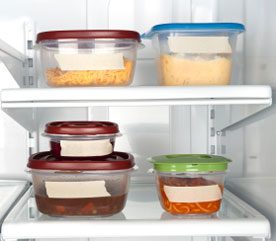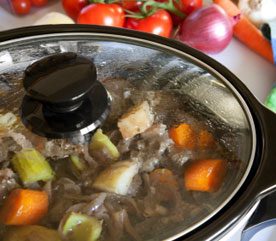
1. Keep Your Kitchen Tidy
Families tend to congregate in the kitchen, bringing with them newspapers, post, schoolbags, schoolwork, toys and a thousand other little things. Don’t allow it. Set a new policy: the kitchen is for cooking, and, if you have room, eating only. Why? It’s hard to get motivated about cooking if you have to clean up a mess first, not to mention what it does to your mood. The opposite also holds true. A clean, bright, inviting kitchen can be a wonderful oasis after a day of craziness.

2. Like Your Kitchen
Is there music playing? Is there a glass of wine? Is the evening sun shining through the window? Are the knives sharp, the vegetables fresh, the pots good quality, the worktops clutter-free? All of those contribute to your desire to make good food. If you don’t enjoy being in your kitchen, do what you need to change that.

3. Plan a Week’s Worth of Dinners
Many of us don’t know what we’re having for dinner as late as 4 p.m. Yet planning ahead takes just a few minutes. Here’s how to do it. Every Friday night or Saturday morning, sit down with a pad of paper and your favourite cookbooks or some cookery magazines. Think about what’s in your freezer and fridge, what your family likes to eat, what your upcoming week entails. Then plan out a week’s worth of menus (you can always leave one night for takeaway pizzas). At the same time, write out your shopping list. Now stick the list of menus on the fridge or bulletin board so it’s the first thing you see when you get home. Voilà! No more thinking ahead.

4. Enjoy the Cooking Process
Of course, not everyone loves cooking. But there’s no reason to not like doing it. If the thought of cooking fills you full of dread, you need an attitude adjustment. Cooking is a pleasure, far easier many non-cooks realize. For the sake of your health, your pleasure and your wallet, you should learn – or relearn – the pleasures of cooking. Make it a project. Spend time with your friends and family while they cook so you can absorb the methods and routines. Consider taking a class, or buy an introductory cookbook. Most of all, lose your fear. It is harder to be a bad cook than a good cook, particularly if you use good ingredients.

5. Delegate, Delegate, Delegate
If you have children aged 10-plus or another adult who gets home before you, get them started on dinner. For example, you might ask your partner to pick up ingredients on the way home, your teen to start chopping vegetables for the salad and fill the pasta pot with water, and your pre-teen to gather necessary ingredients for a given recipe and put them on the worktop for you, preheat the oven and set the table. Yes, they may think of it as a chore, but if you build in a little opportunity for them to ‘create’ (for example with place cards for dinner, fancy napkin folding, their own recipes) it will make your children more interested in nutritious food and will encourage them to try new things.

6. Stock Your Freezer With Homemade Meals
Stews, soups and chilli all freeze wonderfully. Work out how much of a one-pot meal you need to feed your family for one dinner, then buy plastic containers of that size. Make a pot of your family favourites at the weekend and you’ll have four or five meals waiting in the freezer. A smart freezer is filled with plastic containers of several different homemade meals, each labelled with the contents and the date it was made.

7. Base a Meal on Good Quality Soup Stock
Soup makes a great dinner. It’s healthy, filling, delicious and easy to make. If you keep homemade chicken stock in the freezer, or cans of low-salt soup stock in the cupboard, it often takes just a few minutes to whip together an impromptu vegetable soup. Use 1-litre of stock or low-salt chicken consommé as the base. Then just toss in a variety of chopped veggies such as spinach, carrots, sweetcorn, peas, green beans and courgettes. Be sure to include lentils, chickpeas, butterbeans and other legumes. They provide an array of micronutrients, and are filling and satisfying at a relatively low cost in calories. To round out the meal, have some whole-grain bread (dip it inn olive oil rather than spreading it with butter) and a salad.

8. Invest in a Slow Cooker
Imagine popping a few ingredients – chicken, a few vegetables, barley and stock – into a slow cooker before you leave your house in the morning and coming home to a satisfyingly healthy home-cooked meal. Or waking up to the delicious aroma of bread in the timed bread maker. These gadgets can make life simpler and tastier.

9. Try New Recipes on Weekends
You’ll get more enjoyment from cooking if your mind feels rested and unfettered. Once you get the hang of a new recipe, you can incorporate it into your weeknight repertoire.

10. Keep Shopping Lists and Recipes on the Computer
That way, you can just rotate your weekly menus (along with the shopping list) every month or every two months. Thus, once you have, say, eight weeks of menus, you’re set for the rest of the year.